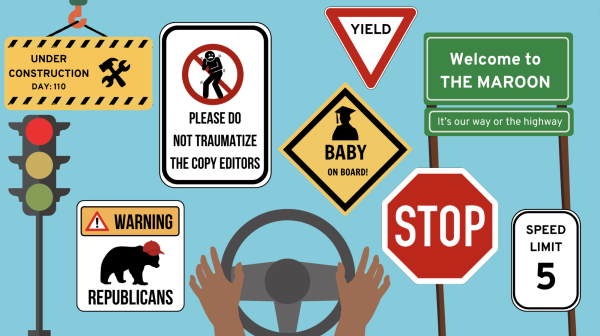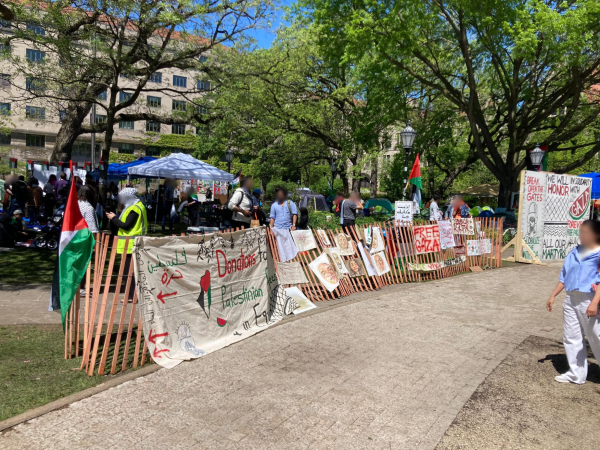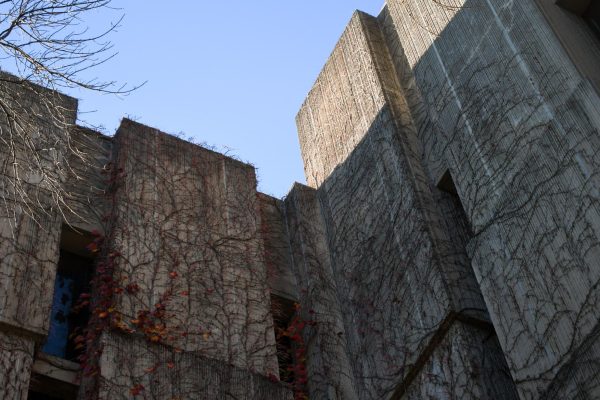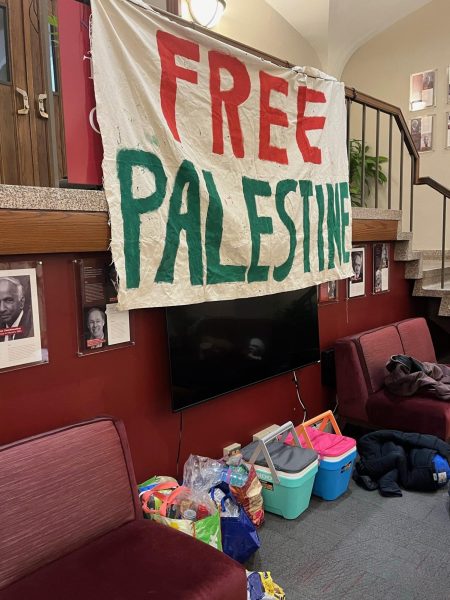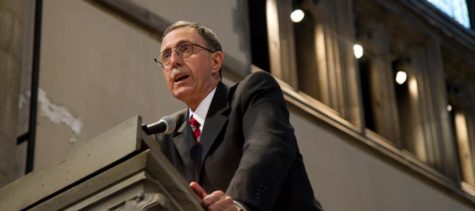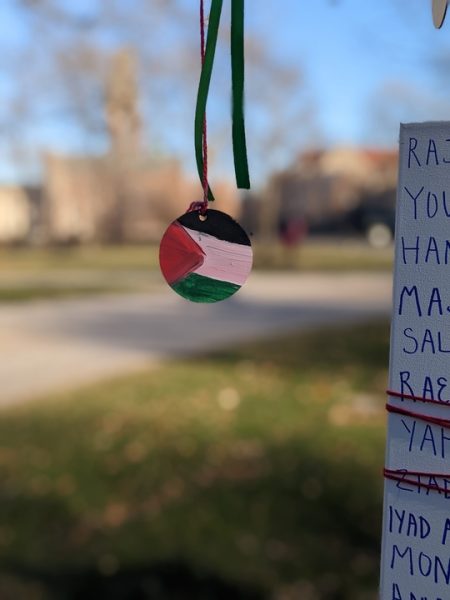An Apology From the Viewpoints Head Editors Regarding Recent Op-Ed
—
April 2, 2022
Note from Gage Gramlick (editor-in-chief) and Yiwen Lu (managing editor): Viewpoints maintains partial editorial independence from The Maroon. This means that the following apology does not constitute an institutional perspective and represents only the views of the current Viewpoints Head Editors. The Maroon is committed to serving our community in its entirety: We condemn hate of all kinds, and we are committed as individuals and as an institution to engaging meaningfully and completely with the subjects of our coverage and all community voices. We hope that this apology generates further conversation, and we strongly encourage readers to respond. Additionally, as per Viewpoints policy, the writers of this apology will be barred from editing any submissions pertaining to the removal of the op-ed, the apology itself, or Students for Justice in Palestine at the University of Chicago.
As Viewpoints editors and members of the UChicago community, we stand against hate and strive to create a productive platform for opinions. On February 17, 2022, we failed in this mission. We made the choice to publish an op-ed that contained factual inaccuracies. These factual inaccuracies, contrary to Viewpoints’s goals, flattened dialogue and perpetuated hate toward UChicago’s chapter of Students for Justice in Palestine (SJP UChicago), Palestinian students, and those on campus who support the Palestinian liberation struggle. We failed as Viewpoints editors and as members of the UChicago community when we published this article, which was not fact-checked as thoroughly as it should have been. We deeply regret this oversight and the harm that our decision inflicted. We apologize to every member in SJP UChicago and all others who were affected by this decision, and we vow to take concrete steps, which we enumerate in this letter, to prevent this from happening again.
After further reflection on what we believe the role of opinion journalism should be, we have taken this op-ed down. We do not take this action to hide our mistakes but rather to take responsibility for the damage the op-ed has done and to prevent further harm. Below this apology, we include corrections to the factual inaccuracies in the op-ed and the text of the op-ed itself as context for those corrections and as documentation of our errors and our commitment to redress them.
Viewpoints is a space that intends to facilitate free speech on campus and in the surrounding communities, and a large part of that facilitation is diligent fact-checking. It is our editorial responsibility to ensure that our writers’ words are grounded in facts, and by choosing to publish this op-ed, we did not fulfill this responsibility. As a result of this failure, the factual inaccuracies in this op-ed were used to delegitimize and undermine SJP UChicago’s campaign and the larger movement on campus and beyond for Palestinian liberation and self-determination.
Additionally, we recognize that The Maroon as an institution has a history of publishing and contributing to anti-Palestinian sentiments on campus and beyond, and SJP UChicago has compiled and protested articles they see as fitting this pattern. Within this history, Viewpoints has particularly failed in seeking out and representing the voices of Palestinian students. Although we cannot undo these harms, especially the role of Viewpoints in contributing to said dangerous rhetoric, we are committed to doing better through a larger and ongoing reevaluation of our editing processes for opinion pieces. This includes a higher threshold for accepting submissions; upholding our commitment to free speech by being more scrupulous in our fact-checking; involving our entire Viewpoints editing team throughout the editing process, especially in acceptance and publication decisions; and ensuring that if a submission critiques a person or group, additional attention is paid to the article by including our Diversity, Equity, and Inclusion committee and copy chiefs in the editing and publication process.
As Viewpoints editors, we seek to break the pattern of anti-Palestinian rhetoric in The Maroon. As student journalists, we are learning from our mistakes and committed to growing into more thoughtful and ethical writers and editors. In working toward this goal, we acknowledge the same damaging pattern within many journalistic institutions, particularly in mainstream news outlets, and we seek to combat this within our own newspaper. We must include conversations about power and safety in our decisions about how we should platform the voices in our community, and we must reexamine the idea of journalistic objectivity. As Viewpoints editors, we believe that our commitments to journalistic integrity and The Maroon’s mission require us to take political and cultural contexts into account in our coverage. We are committed to free speech and to considering opinions submitted from all sides of a story—free speech cannot be opposed to critical thought and nuance. We must acknowledge the potential for our coverage to perpetuate imbalances of power and to threaten the safety of members of our community. We want Viewpoints to be a space in which students and community members can express their opinions freely, without creating an environment in which other students are no longer safe to share their opinions and realities.
In working to achieve this goal of inclusion and productive discourse in Viewpoints, we must acknowledge that our decision to remove the op-ed may affect Jewish students on campus. The factual inaccuracies in the op-ed were used to support Zionist and racist sentiments that relied on oversimplified narratives, setting Jewish people and Palestinian people at odds and presenting both communities as generalized monoliths without any acknowledgement of the multifaceted identities we know to exist in these communities. Given this narrative, we understand that removing the op-ed from the website could be seen as stifling Jewish voices, but that would go against our values of inclusion and free speech and contribute to the antisemitism that is already all too present in the lives of our Jewish peers. We want to emphasize that we are committed to providing a welcoming platform for dialogue that is founded on facts. We have removed the op-ed in accordance with the values we described above and because of the factual inaccuracies we detail below.
Corrections to the factual inaccuracies:
What was written: “Jewish-taught and -related classes.”
Fact-checking: SJP UChicago’s boycott addressed “classes on Israel or those taught by Israeli fellows.” Israeli and Jewish are not synonymous.
What was written: “SJP sought to intimidate UChicago students and coerce them into dropping all classes related to Israel or taught by an Israeli professor.”
Fact-checking: SJP UChicago’s boycott reads, “Classes taught by Israeli fellows and funded by the Israel Institute are clearly products of a complicit institution; this, and not simply their instructors’ nationality, is why we called on students to boycott them.” An Israeli professor is not the same as the boycotted “Israeli fellows,” which in this context denotes affiliation with the Israel Institute.
What was written: “The Jewish people use a lunar calendar, where each day begins on the sunset the day before, which meant that the posting of the slides overlapped with Holocaust Remembrance Day on January 27. We believe that this was done to isolate and alienate the Jewish population at UChicago and to interfere with a day of mourning.”
Clarification: Some Jewish people use the Hebrew calendar, which is lunisolar. The Gregorian calendar is solar. International Holocaust Remembrance Day, as designated by the United Nations General Assembly, falls on January 27 from 12 a.m. to 11:59 p.m. on the Gregorian calendar. On the Hebrew calendar, the day of remembrance is observed starting at sundown on April 27. The post was not published on a Jewish holiday. In a statement, SJP UChicago said that the organization “has never made and will never make a post with the calculated intention of demonizing an ethnic or religious population.”
What was written: “SJP members later approached students in the quad about banning the classes in the post, reiterating the misinformation and attempting to demonize students in those classes.”
Important additional information: SJP UChicago’s statement on this incident includes the following: “This likely refers to an event in which, while watching over the February 15 installation, two SJP members were approached by a student who inquired about the Instagram post. The two members reiterated the points made in the post respectfully, and were in fact unaware of the political affiliations, intentions, or classes of enrollment of the inquiring student.”
The original boycott campaign can be found on SJP UChicago’s Instagram page.
The original text of the published op-ed:
“Heading: We Must Condemn the SJP’s Online Anti-Semitism
Subheading: The SJP’s recent calls to boycott Jewish-taught and -related classes, posted to Instagram on Holocaust Remembrance Day, are anti-Semitic and must be condemned.
Social headline: OP-ED: “SJP has a continued pattern of anti-Semitism that must be condemned by students and the University alike.”
In order to protect the authors’ identities, their names have been omitted. The authors consented to this omission.
“After sunset on January 26, Students for Justice in Palestine (SJP) UChicago released a post on Instagram telling students to “Stop Taking Sh*tty Zionist Classes.” SJP has a continued pattern of anti-Semitism that must be condemned by students and the University alike.
The Jewish people use a lunar calendar, where each day begins on the sunset the day before, which meant that the posting of the slides overlapped with Holocaust Remembrance Day on January 27. We believe that this was done to isolate and alienate the Jewish population at UChicago and to interfere with a day of mourning. The following day, SJP posted a story in response to receiving backlash about posting on Holocaust Remembrance Day, showing that they in fact posted the day before, not the day of. But posting after sunset was itself an affront—it distracted from Holocaust Remembrance Day, especially as the post circulated and was promoted on the day of mourning itself.
In the post, SJP sought to intimidate UChicago students and coerce them into dropping all classes related to Israel or taught by an Israeli professor, deeming them Zionist classes. The post states: “Support the Palestinian movement for liberation by boycotting classes on Israel or those taught by Israeli fellows. By attending these classes, you are participating in a propaganda campaign that creates complicity in the continuation of Israel’s occupation of Palestine.” The targeting of classes taught specifically by Israeli fellows is xenophobic as Israelis cannot change their nationality, and this post demonizes that nationality by declaring all courses taught by someone affiliated with the nation as propaganda. Further, all courses listed are explicitly within the University’s Jewish Studies center. This furthers the trope that Jewish courses and professors work to contribute to propaganda for Israel, which is a blatantly false narrative.
UChicago prides itself on its free speech policy, encouraging students to broaden their education and ask tough questions in classes. Instead, this SJP post actively encourages students to drop such classes, hence discouraging educational freedom. This also violates the University’s discrimination and harassment policies, as the Israeli faculty are directly discriminated against. As such, the Jewish student community is indirectly discriminated against. Further, the harassment policy states that any organization that utilizes social media and other tactics—such as handing out flyers to intimidate students—in order to interfere with the education of students is harassment.
SJP members later approached students in the quad about banning the classes in the post, reiterating the misinformation and attempting to demonize students in those classes.
After several days, SJP edited their post’s caption. In this, they defined “Jewish national identity” for the Jewish community. In their explanation of the use of Jewish national identity, they wrote, “A more unambiguous term may have been ‘Zionist National Identity’—‘[I]sraeli nationalist identity’ would have been incomplete.” This statement confirms that the post was indeed targeting Jewish students. There was no apology or any other statements regarding the comments or complaints about the post, meaning that SJP saw nothing else wrong with what they posted.
Although this incident has caught the attention of international organizations such as Jewish on Campus (JOC), neither the University nor the student government has responded.”
In order to protect the authors’ identities, their names have been omitted. The authors consented to this omission.
We stand against hate in all forms. We condemn the pitting of Jewish and Palestinian students against one another, and we deeply regret the extent to which the op-ed’s factual inaccuracies—which we should not have published—perpetuated such a harmful dynamic. We support both Palestinian and Jewish communities and condemn anti-Palestinian and antisemitic rhetoric on campus and beyond.
This apology is part of larger, important conversations about journalism and racism. We encourage submissions from members of the UChicago community on these matters and recuse ourselves from editing columns and op-eds pertaining to the removal of the op-ed or the apology itself as well as any further submissions about or from SJP UChicago.
—Elizabeth Winkler and Kelly Hui, Viewpoints Head Editors
Viewpoints, the opinion section of The Maroon, maintains partial editorial independence from the publication. The views expressed here do not constitute an institutional perspective and reflect only those of the current Viewpoints Head Editors.


